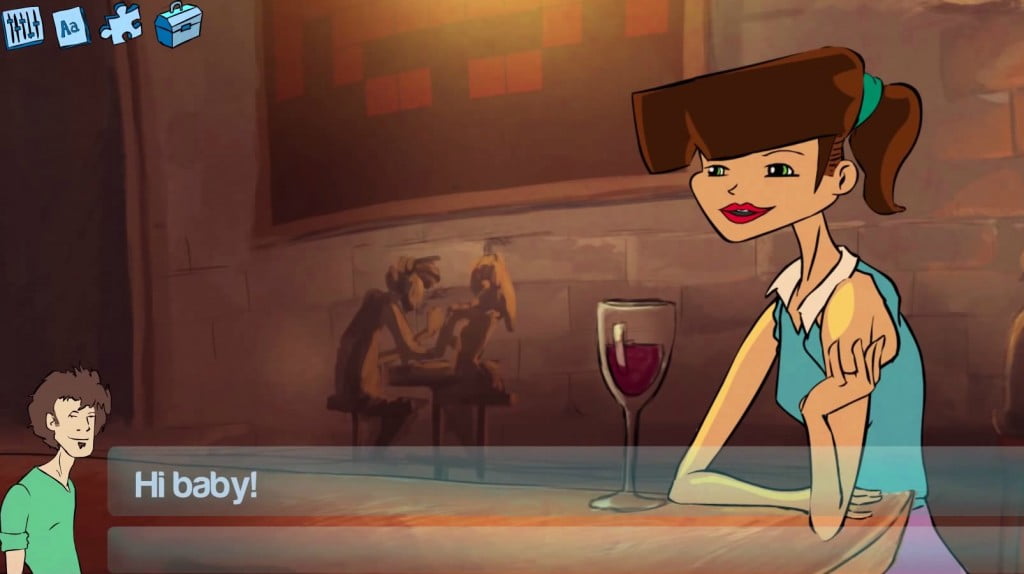Any seasoned traveler knows the feeling—you arrive in a foreign country where you are clueless about the language and all you want to do is order lunch. Somehow, after pointing and using the best of your mime skills you still can’t seem to get the message across. This equally awkward and frustrating situation, forcing you to use the local language, is exactly how the people at the free Israeli-developed language game Immersia believe everyone should learn languages.
With Immersia, a new language-learning adventure game released in November 2013, the user enters an entertaining and interactive game experience set in a “local” French bar. The game compels the user to immediately enter character, placing them in front of a beautiful French lady who wants to be impressed, or in conversation with a bartender while they order a virtual beer. Without understanding a word of French, Immersia immediately engulfs the user in the language, asking them to respond to one of the game’s especially impatient virtual characters in French.
Related articles
- Wheeldo: Using Gaming To Train And Learn About Your Employees
- Lingua.ly Transforms The Web Into A Language-Learning Opportunity
“One of the reasons why adults have so much trouble learning new languages is that they are afraid to sound stupid as opposed to children who are just talking and get corrected. So one of the main advantages we have is that you start talking immediately but not to other ‘real’ people,” Immersia founder Roni Herut tells NoCamels.
Testing your hidden French potential
According to Immersia, about 70 percent of people who start learning a new language drop it within the first month. For this reason the game starts off simple, using words that are very similar or the same in English and French.
“The first sentence you learn in French is ‘Le service est terrible’, or ‘The service is terrible.’ For an English speaker it is very clear what this means. In French for example the correct way to say ‘My name is Roni’ is ‘Je m’appelle Roni.’ We went with ‘Je suis Roni,’ or ‘I am Roni’ because for English speakers it’s easier to learn,” Herut explains.
The Immersia gamer records their responses to the virtual French bar-goers using a voice recognition system that either accepts the user’s answer or asks them to repeat it. If the user answers correctly, points are added to their overall score in the game. If the user does not know the answer (and needs to refer to a direct translation) or answers wrong, they lose points, creating incentive, like the popular language learning program Duo Lingo, to keep going and improve their score.
[youtuber youtube=’http://www.youtube.com/watch?v=euAbY1jHm8U’]
Sign up for our free weekly newsletter
SubscribeAccording to Immersia, the entire game is based on the element of surprise—surprising the user with how much of a language they may already know as well as urging them to be creative in their conversations with the game’s characters. Only as the user progresses to higher levels do they begin to learn more advanced and accurate expressions along with some grammatical rules, and there’s always the pocket dictionary which the user can turn to for quick reference.
Learning from real life
Founder Guy Bar-Ner came up with the idea for Immersia after he got stuck trying to learn German in university courses and from books. When he was put in the situation of actually needing to ask where the subway was, all the grammar and verb conjugations he’d learned didn’t help much. “I think learning everything, but especially a language, should come from the experience and should be fun, not just grammatical tables and rules.” That’s why the Immersia platform was designed to be an interactive adventure game, simulating real-life situations in which the user is forced to make their way around a foreign country, using the words they know (or don’t).
The game is currently available in French, Hebrew and English. “The first endeavor was French and then we developed Hebrew for English speakers and English for Spanish speakers. The most successful program is currently French. Last time I checked we had 3000 users from over 80 countries,” Bar-Ner proudly tells NoCamels. The current game offers three levels and the opportunity to learn 120 new words and 16 complex phrases.
Free French for all
Even better than learning a difficult language like French in a fun adventure game is the fact that Immersia is currently free for all users according to Immersia’s “Freemium” business model. This means that the French game will remain free of charge on their website, but that the user will be charged if they want to delve deeper into the learning experience with extra features like business English, meeting and talking to new characters and entering new places in the game.
The company plans to expand the game to other “realms” where the player will use a taxi; visit a hotel, a university and an office, as if they were visiting the country themselves. The Immersia team also hopes to add new languages, like Hebrew (using the Hebrew alphabet), Spanish, Russian, Japanese, German and Chinese in the near future.
As the options for virtual language learning continue to expand, it seems that traditional ways of teaching languages become less and less effective due to a lack of interactive speech and incentive to continue learning. Immersia’s idea of simulating real-life interactions with native speakers may just surprise and excite its users enough to get them speaking basic French in no time.
Related posts

Editors’ & Readers’ Choice: 10 Favorite NoCamels Articles

Forward Facing: What Does The Future Hold For Israeli High-Tech?

Impact Innovation: Israeli Startups That Could Shape Our Future




Facebook comments